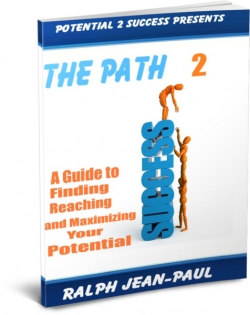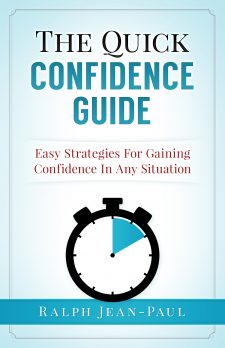“Courage is not the absence of fear, but rather the judgment that something else is more important than fear.” -Ambrose Redmoon
Have you ever seen the game of chicken played in a movie or in real life? The game is played by two people in order to determine who is tougher. In the movies, two guys in fast cars face off and drive towards each other at high speeds until one of them “chickens out” and swerves at the last second narrowly avoiding a deadly crash. The winner of the game is the one who did not flinch.
In the past few days I’ve had several conversations with people on the topic of fear. Fear is a common part of the human existence. But the more I live and try to stretch myself, the more I believe that fear is not supposed to be a part of our daily lives. Especially the type of fear that stops our growth, advancement, and effectiveness.
Like most people, I’ve had to deal with fear. My past fears held me back from opportunities that were potentially life changing. Once I realized how much fear influenced me and prevented me from achievement, I took action.
I have adopted a practice in the last few years of playing ‘chicken’ with irrational fear. What this means is that if I find that there is an irrational fear in my life, I’ll identify it, isolate it, then I run towards it at high speed until the fear flinches. In this article I will show how you can challenge and overcome the irrational fears in your life.
I Must Warn You
At the end of this post there is list of challenges that you can do to combat the fear. The list consists of beginner, intermediate and advanced fear fighting challenges. I suggest that you subscribe or bookmark this post so that once you get your fear fighting muscles up; you can come back and attempt more difficult challenges.
Although some of the fears in the challenges do not apply to me, I have done everything in them so I can relate to some of the discomfort that is felt. I can also say that there is a liberating feeling that follows any challenge that is completed. I’ve decided to choose 3 types of fears that I’ve researched are some of the most common fears. These are also fears that I seem to get questions in my email about.
Opportunity Cost
What are you afraid of and what is it costing you now and what has it costs you in the past? The term opportunity cost is an economic term that is the value of the next best alternative forgone as the result of making a decision. In other words, what are you missing out on by making one decision as opposed to another?
Most people have regrets in life of some kind. How many of those regrets are a direct result of some kind of fear. Some of those fears go back to when they were in high school. Here are some common regrets people have.
-Missed an opportunity to have a great relationship because of a fear of rejection.
-Never went after your dream job or career because of a fear of failure.
-Lost a good relationship because of a fear of commitment.
-Missed a business opportunity due to a fear of risk.
-Did not act on an opportunity purchase something that you really wanted because of the fear of making a decision.
-Allowed yourself to be mistreated because of the fear of conflict.
By allowing our fear to make decisions for us, we are ultimately saying that we are ok with missing out on something much better.
Playing Chicken
Start Your Day with ‘An Act of Courage’
It has been said that getting out of bed takes courage. This is true, but if you really want to beat fear you will need to do something a bit more challenging. Your fight with fear begins the second you wake up. Starting your day with an act of courage can set the tone for your entire day.
One way to start your day with an act of courage is to take a cold shower. It takes courage to sit in icy cold water first thing in the morning. The cold shower forces you to be in an uncomfortable situation voluntarily. You will then begin to breakdown mental walls and see obstacles in your life as challenges to overcome.
Everything in you will tell you to move out of the way of the water or to turn the nozzle and let the warm water relieve you. But if you are able to stay under the water and complete your shower, you will have learned how to battle uncomfortable situations. It is important to have a warm room to walk into once your shower is done.
Hawk Fighting
There are rational fears that keep us safe in life’s circumstances but most of our everyday fears are irrational. The problem is that many of the irrational fears have been with us for so long that we’ve made room for them in our lives. They’ve gotten explained away so much that we don’t even realize that they are fears.
One day while I was walking by a park, I saw a hawk flying at high speed with a tinier, less threatening, bird in high pursuit. The hawk, which is usually the predator, was flying as if its life were in danger. The hawk is a powerful, skilled and dangerous predator. There are few things this mighty bird of prey should be afraid of. So why was it being chased by this harmless bird?
I found out that when their nest and offspring are in danger, these smaller birds will fight off the more powerful hawk. Sometimes, they will chase the hawk long distances until the hawk possess no danger to the nest. This is the same reaction we should have with the fears in our lives.
In dealing with our fears, we need to take the hawk fighting approach. The truth is fear, especially irrational fear, is the enemy. Those types of fears are intruders and should be handled as such. They need to be realized, isolated, and wrestled with until they flee. And just like the intruder hawk, chased away until it no longer presents a threat in your life.
Become a Storm Chaser
The next and final step to making your fears flinch is to seek uncomfortable situations. Seeking uncomfortable situations is a bold and courageous move that will test your resolve. During a peak in my personal development many years ago, I realized how much fear was holding me back. After much debate with myself, I realized that I had to seek uncomfortable situations.
Storm Chasers are those seemingly insane individuals who get a thrill from chasing after tornados. Although tornados are dangerous and unpredictable, storm chasers will often drive towards a tornado with no hesitation. Looking for uncomfortable situations is the same as storm chasing.
In the context of playing chicken with your fear, it is not only important to make the first move and seek out uncomfortable situations. Your ability to conquer uncomfortable situations is directly related to your ability to succeed in all areas of your life. A daily dose of discomfort is a good way to make sure that you are building the part of yourself that can stare fear in the face and not flinch.
Here are some comfortable situations that you may want to seek and conquer. I’ve broken them down by categories and examples so that you can choose which would best fit.
Social fears usually stem from a fear of what others will think of you. The other part is that some people do not have much experience in dealing with other people now or when they were growing up so they never really had the opportunity to improve their social skills.
1. Social Fears
Social fears include: Fear of rejection, fear of loneliness, fear of intimacy and others.
Beginner Challenge
–Greet 10 new people. Be sure that you greet them first do not let them greet you or it doesn’t count. Do this at least 4 days the first week or until you feel comfortable.
–Make a statement to 7 new people. Compliment, asking simple question, or saying something funny will count.
–Start a conversation with a stranger that last between 4-5 minutes.
Intermediate Challenge
–Start a conversation with 5 new people that last at least 4-5 minutes.
-Find a person that you are extremely attracted to and hold a 10 minute conversation. The person must be someone who’ve never conversed with before.
–Make two friends in a week. After meeting and conversing, make a friend out of someone new. These must be actual connections with an exchange of phone numbers and plans to talk againsoon. Not just a Facebook, Twitter, Myspace, Linkedin etc connection.
Advanced Challenge
–Give a speech to a group of strangers. There are several places to do this. You can join Toastmasters where you can give a speech. Or maybe you can write a short and simple poem and go to a poetry reading and present it there.
–Break into a group of people and become a part of that group. Go to a public place like a coffee shop or where people hang out in groups. Sit close by and join in on the conversation. Then, work your way so that you become a part of the conversation.
–Get numbers from 3 people you are attracted to. Most people are nervous around people who they are attracted to. Approach 3 strangers and engage in a short talk and then attempt to get their number. If you are in a relationship, you can toss the numbers but the approach and asking will get you out of you comfort zone.
|
“I have not failed 10,000 times. I have successfully found 10,000 ways that will not work”-Thomas Edison |
2. Inadequacy Fears
Inadequacy fears deal with the fear of not being good enough. They are usually hidden because we rationalize them away. They are easy to hide because if a person has the fear that they are not going to be good enough, they will just stay away from the thing that they feel they can’t do.
Part of the issue of this is that the fear of success and the fear of failure fall into the same category. A big part of the fear of failure is the feeling of not being good enough. One of the big parts of the fear of success is getting what you want, but having the feeling of that not being enough.
Inadequacy fears include: fear of failure, fear of success.
Intermediate Challenge
–[Failure]Fail small then stop. Choose something that you would like to do that may be difficult. You can play a brain game, or any challenge that you may fail. If you succeed try something more difficult. Once you are beaten, be sure to acknowledge your part in not being able to succeed.
-[Success]Succeed small. Set a small goal that you have not done before. Succeed at the goal and monitor how you feel afterwards. Be specific when setting the goal and then achieve the goal exactly the way you set it. For example, if you set a goal to run two miles, then make sure you run the entire two miles without stopping. No walk/running.
Advanced Challenge
-[Failure]Fail big. Choose something that you have been putting off because it is too hard. Think about the worse possible outcome if you attempted that thing and you failed. Then, think about what you could do to recover from that failure. After that, begin to attempt that thing but this time, persist. The idea is to experience the failure and not let it affect your will and determination to achieve that goal.
You will also begin to understand that the failures provide good learning experiences. When we’ve failed so many times, we begin to think of alternate ways of succeeding that we would have never found without multiple attempts.
-[Success]Succeed big. There is probably one thing in particular that you are afraid of experiencing success. There is also probably something that you have not been willing to do that would help you succeed. Take the huge step towards that goal. Here is the challenge that was introduced to me through a Brian Tracy book.
Write the goal that you would like to succeed in. Then make a list of 20 things that you could be doing to achieve that goal. Do not stop until you’ve got 20 things. Then, do item #20 on the list. The last item on your list is probably the one that will get you the most results and is most likely the one that you are putting off because of fear.
|
“There is no security on this earth. Only opportunity.” – Douglas MacArthu |
3. Risk Taking Fears/ Fear of Loss
These two fears are so closely related that I put them in the same category. The reason people are afraid of taking risk is in part to what they fear they might lose. The fear of loss is also tied to dependency to a person or thing.
Risk/Loss fears include:losing something important,fear of the unknown
Intermediate Challenge
-(Risk)Write down ten situations that you may face where you do not know what the outcome may be. For example, asking out someone you like but are not sure if the feeling is mutual. Then go down list and run the best case scenario and worst case scenario in your mind.
This challenge is more difficult if the fear you have is a strong phobia. Just the thought of the unknown is scary for more people because they tend to think of the potential negative outcomes. This challenge is good for focusing on the positive outcomes so that taking the risk is not as frightening.
-(Loss) Give away an article of clothing, one of your favorite DVDs, or CDs. You must have worn the item of clothing or used the DVD or CD recently. Do not replace the item for at least 30 days.
Advance Challenges
-(Risk)Buy a troubled stock. Open an online brokerage account. Then go to Google Finance and look at the stocks that seem to be in trouble. Then choose a stock that has a chance (small chance) of bouncing back. The size of your investment will depend on how much you are willing to lose. There is also an off chance that you will make a profit. This would also benefit you in the challenge because you will experience the positive results of risk taking.
-(Loss)Give it up. Give an extra 10-15% of your next paycheck to a charity that you haven’t already given to. For me, this did two things. First it helped me loosen any dependency I may have had to having a certain amount of money in the bank. This also helped me realized how much is gained by others if I am willing to lose a little. I began to feel as though what I thought I was losing, wasn’t really lost.
You are the boss of your fears. Use these challenges to identify, control, and defeat the fear that is holding you back.


 Subscribe for free today and get a FREE copy of my ebook The Path 2 Success. Begin your path today!
Subscribe for free today and get a FREE copy of my ebook The Path 2 Success. Begin your path today!










